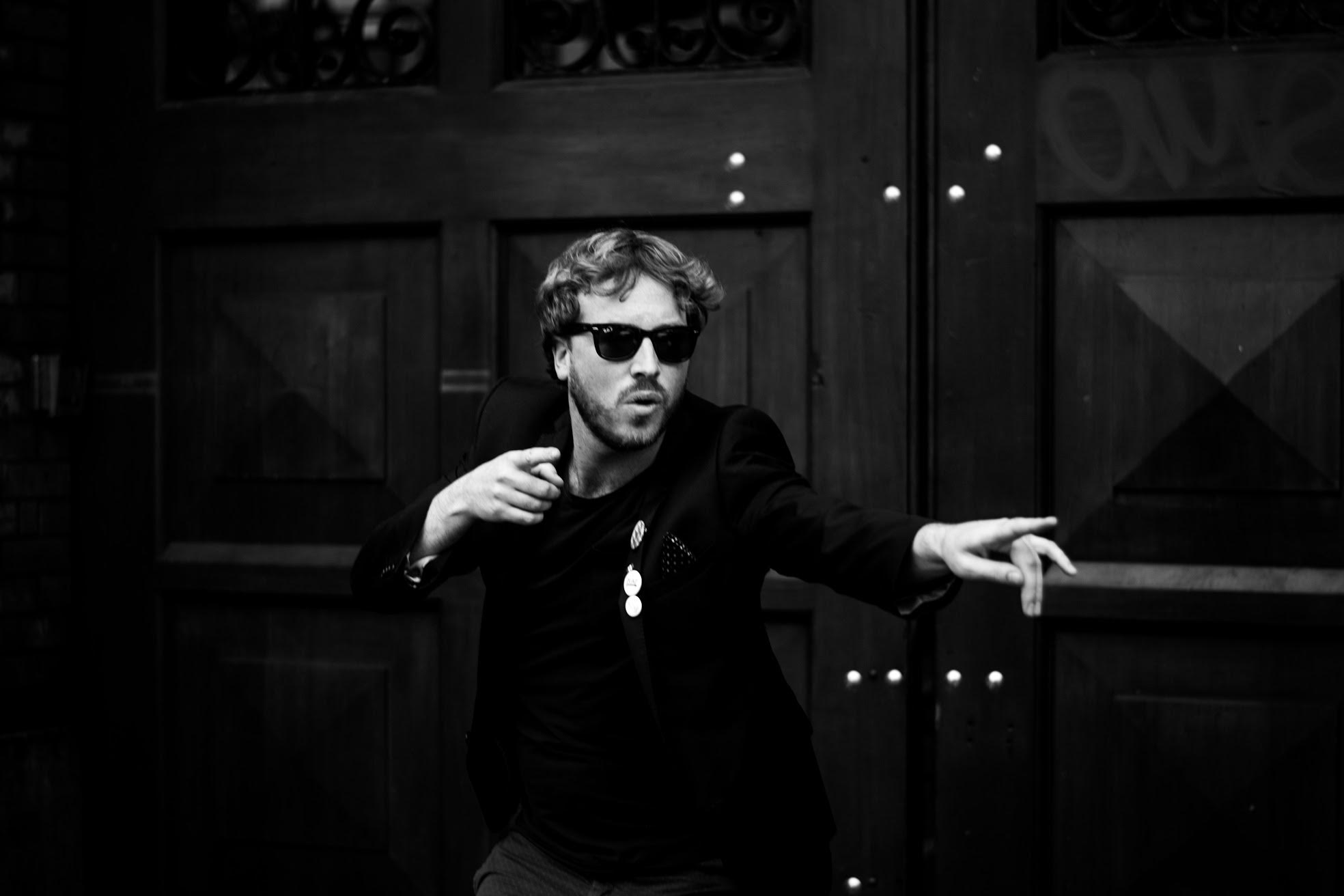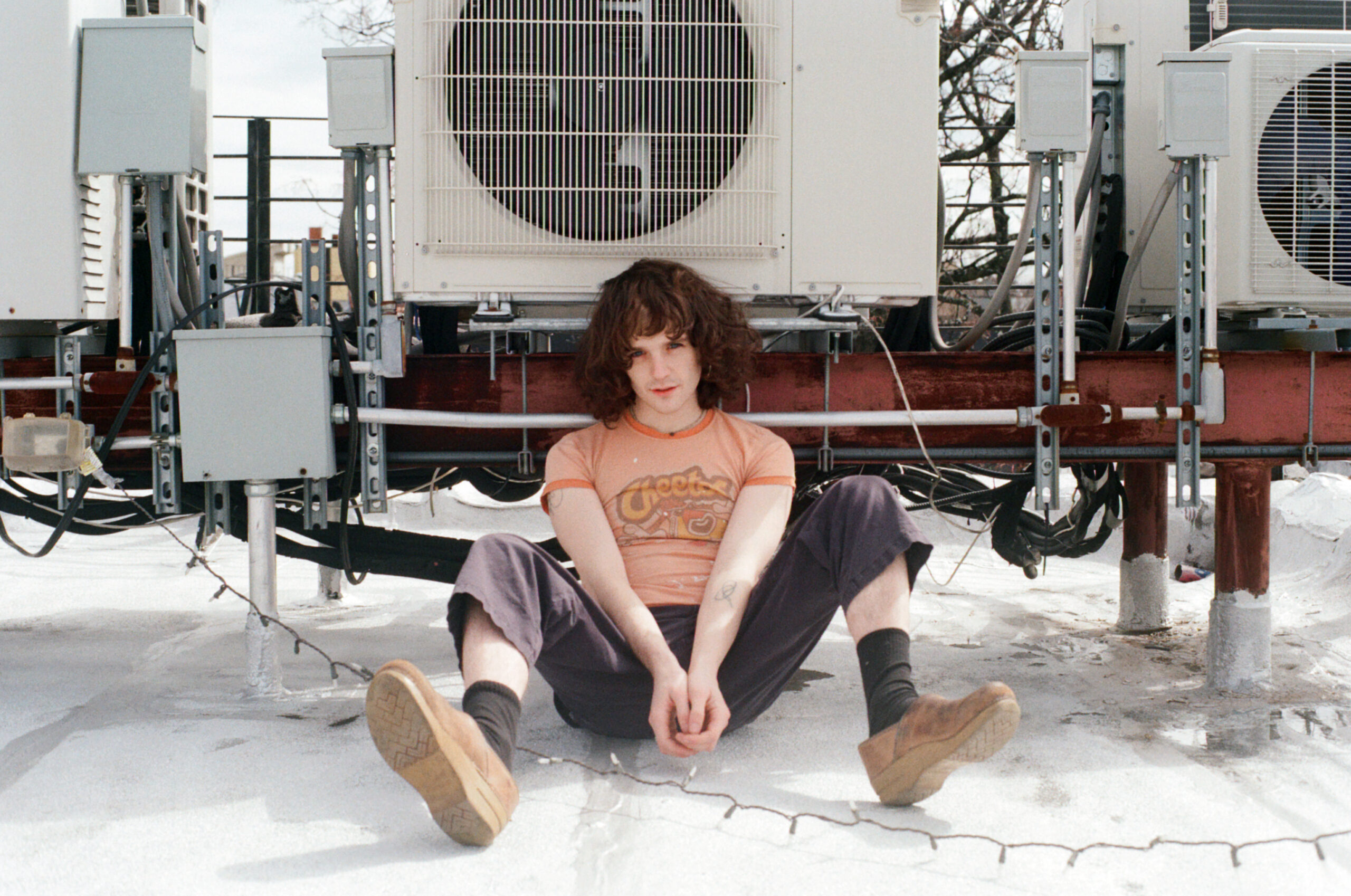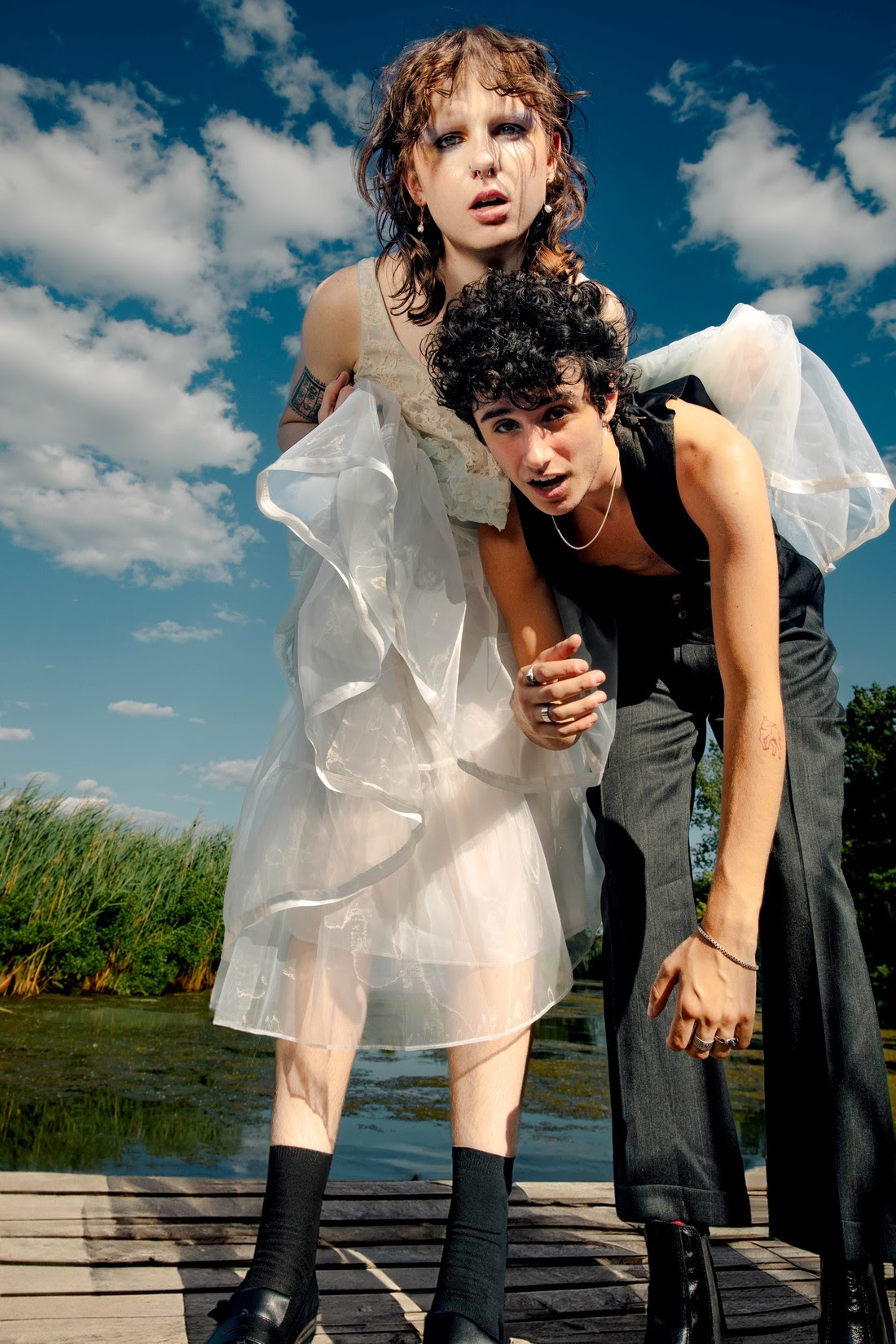It played out like a scene in a downbeat, indie-level This Is Spinal Tap. In one of his succession of failed projects, Irish songwriter Paddy Hanna found himself playing an outdoor festival in the middle of his home country. Thanks to breaking some keyboards right before the gig, the band had hastily reimagined all their material as guitar-driven punk tunes. Part adrenaline, part "fuck it, this is a mess anyway," Hanna spotted a lamppost in the crowd and decided to climb it. So he leapt off the stage and managed to scale the thing, and perched up there screaming. It … did not exactly make an impact. Once up there, Hanna surveyed the landscape and found families continuing on with their picnics, children having their hair braided, people getting their face painted. Rather than suddenly be aghast at this man screaming atop a lamppost, their reaction was even worse: They didn't really notice. “I was like, 'Jesus Christ, I thought this was cool,'” he deadpans in recollection.
Small moment as it was, it's an anecdote that sums up a lot of Hanna's career along the way: the missteps and little embarrassments, the forced attempts at band life that didn't quite take, the growing pains necessary to find his way towards himself. Plenty of artists take that kind of road. And maybe some of it is Hanna being stereotypically Irish and self-deprecating, but he fills his account of his 20s with tales of similar faceplants, casual backstabbings from bandmates, and drunken stupidity, whether of the classic variety of decamping to a small town for a writing session and spending it at the pub, or whether him self-sabotaging his twee-indie band by getting wasted and wailing about blowjobs over their precious music.
I first came across Hanna some years after all that, just last September. I was in Dublin for a conference/festival called Hard Working Class Heroes, a sort of Irish CMJ or SXSW (if we're talking about a much older, smaller SXSW) that exclusively showcases up-and-coming Irish talent. It was at the Workman's Club, a venue and nightclub positioned right on the river in the middle of Dublin that offers the strange experience of making you feel like you're literally making your way through a tall, old Irish house with dance music blaring from one level or another. On the first level, there's a more traditional venue room, where Hanna offered a spirited, sweaty rock show. The type of show that takes classicist-leaning songs and breaks them open into runaway, beer-soaked rockers for immediate impact. Hanna had presence that night, suggesting those missteps had all accrued into a long-term trial-by-fire. Able to switch from a croon to a bark and deploying just the right amount of dry interjections to keep the whole thing from getting too self-serious, he came across something like an earnest troubadour with a sarcastic streak.
Though he's still an unknown abroad, Hanna already has a bit of a cult following in Ireland, and he was one of the bigger names at Hard Working Class Heroes. His was the most impressive, assured set I saw at the festival, and several of Hanna's songs -- like the sneakily infectious and dustily jangly "Bad Boys" or the churning "Austria" -- lodged themselves in my head soon after. I unexpectedly found myself back in Dublin a month later, where I caught up with Hanna ahead of the upcoming release of his sophomore album Frankly, I Mutate.
The occasion we're meeting for, strangely enough, is that Hanna's been asked to play a wedding. (More on that later.) Beforehand, we find each other at a pub called the Long Hall, a pretty old-school Dublin spot that also happens to be one of Bruce Springsteen's favorite pubs in town, supposedly. The Paddy Hanna I saw onstage is a different half of the man you'll talk to in conversation. He's the first to admit, due to some fair bits of social anxiety, that he can be an awkward figure, refusing to make eye contact and tumbling through stories with a nervous, if always amusing, energy.
Now in his early 30s, Hanna's a few years into being a solo artist. His debut under his own name, 2014's Leafy Stiletto, received a bit of acclaim around Ireland, including in The Ticket, the music insert of The Irish Times that had been a formative publication for Hanna growing up. Aside from gigging around Ireland, he spends his time working at a gift shop and writing music from his home, a cozy house overlooking the sea from the cliffs in Howth, a Dublin suburb that attracts tourists for its seafood restaurants and dockside walks. Hanna, characteristically, is quick to reveal the more unnerving counter-narrative, alluding to the stereotype of people committing suicide by jumping from those same cliffs.
Hanna's been making music his whole adult life. There was one band when he was about 20, that he claims took a bunch of his ideas and ran off with them; they went on to find some moderate success at the time, without Hanna in the fold. In response, around 2007 Hanna formed the aforementioned twee band, which he often refers to as the "toy-pop" band given their predilection for quirky non-instrument-based sounds, the one from the ill-fated outdoor festival gig. It didn't fit from the beginning, but he kept going with it, perhaps in an attempt to impress the musicians around him and perhaps in an attempt to fit into some overarching trend of the time. His account of the experience makes it sound like a slow-burn disaster of treading water, him stuck making music he didn't believe in and a band that was listlessly drunk and pulling the music in too many disparate directions. After two records with them, Hanna decided he was done and it was time to strike out on his own.
Leafy Stiletto came out when he was 29 and found him trying to craft, as he deems it, "'70s drivetime music." "I wanted, for the first time in my life, to make a structured album," he recalls. "Cover to cover, this sounds like a record. We managed to do it." It was the fist time Hanna felt like he'd put out an album that was truly himself, truly the music he wanted to make. But despite having won that particular battle and watching Leafy Stiletto garner some percolating attention, he still found himself held back by his personal battles.
There are those qualities that betray his difficulty in interacting with people, the darting or averted eyes and the anxious sweatiness. As charming a storyteller and conversationalist as Hanna can be, he attributes those characteristics as being off-putting when trying to do the whole "network with music industry types" part of the business. (This is why seeing him onstage may be the most crucial introduction to Hanna's music, to see the man transformed, possessed.)
But most significantly, Hanna suffered from undiagnosed depression until only a couple years ago. In hindsight, he credits his lack of understanding regarding his condition for all the speed bumps along the way, the fact that he let this or that bandmate walk all over him, take advantage of him. "I went through my whole life not knowing what depression was and assuming that the way I function was normal," he remembers. "But of course, when you don't realize your condition, you make a lot of bad calls."
What was worse was that, when it came time to capitalize on the minor momentum of Leafy Stiletto and work on a new album, Hanna found himself crash-landing into a severe depressive episode. "You know how it is," he says, managing to maintain that same sardonic approach even when we veer into the heavier subjects. "You can’t do anything really and you’re borderline suicidal the whole goddamn time." Hanna tries to write every day, and theoretically that could've helped during that phase; but, as it goes, the depression had a way of encouraging self-sabotage. "You retreat away from anything that'll be beneficial," he describes it. "Even though your soul is crying for you to fix all these problems, the darkness won't let you. You're constantly fighting that shit."
One major musical benefit came out of it, in the end: Hanna's song "Camaraderie," one of the only times he's tried to write about his depression head-on. He found it to be blunt, on-the-nose. Then he was taken aback to find how much people connected to it. The video that accompanies it is a striking visual, Hanna alone in a pristine, modern house, wearing the same ill-fitting suit he wore in the "Austria" video, singing right into the camera and refusing to avert his eyes as usual. "I deliberately wanted the worst-looking suit," he jokes about the videos. "I describe it as being the kind of suit where you can still feel the barstool on the ass of it from whatever drunk wore it before." It was a low-key bit of depression symbolism. "You get the perfect house and then you put an imperfect individual in it," Hanna says. "Then you have drama. You have a story."
Released in 2015, "Austria" and "Camaraderie" wound up functioning as stop-gap, transitional standalones on the road to Frankly, I Mutate. To get to that second album, Hanna had to make it out of that depressive streak, and he found a new collaborator in the Dublin-based producer Daniel Fox (who also plays bass in fellow Band To Watch alumns Girl Band). When he and Fox first met, they talked about what they envisioned for the album; Hanna was won over by Fox's impulse to go in a string-laced, Wall Of Sound, classic pop type direction. At that point, Hanna had something like 60 demos he hadn't played anyone yet. "Some of the songs I would write would be very downbeat, or some would be almost Prozac-level happy," he recalls. "A dulled sense of happiness."
He and Fox culled their favorites from the batch. Then they stuck close to those demos, playing and recording the songs as they were. "We didn't want to posh up the structure of them," Hanna asserts. "Me playing in my dyslexic style of not knowing song structure, we wrote string arrangements to fit around that basically." Another collaborator Hanna credits with helping bring Frankly, I Mutate to life was Ena Brennan, who actually worked those string arrangements out of melodies Hanna would hum to her.
The end result is an album that is somewhere in between sophisticated chamber-pop and damaged art-rock and the more arcane corners of Britpop. One of the obvious forebears for Hanna's current sound would be Scott Walker's orchestral, frantic pop, but if you filter that through a few more decades you can also hear flickers of ragged Bowie, a lighter Nick Cave, a zanier Jarvis Cocker. There are songs that sound like ragged, whiskey-soaked mixtures of the Walkmen and the Waterboys. Ultimately, it's an album that takes its turns being beautiful, catchy and bubbly, and frayed and grieving. Hanna may often still be writing '70s drivetime music, but across Frankly, I Mutate you're not always sure when the driver may decide to take the car off the road and go crashing into a few Dublin storefronts, or off one of those Howth cliffs.
"It's one of those records where you're trying to write really solid pop songs through a tremendous amount of pain," Hanna explains. "That notion of trying to be triumphant but not being able to truly hide the despair of it all. When I started making it, that's where we were."
On the other side, Hanna realized that much of it came from him not having properly dealt with the past: his disappointments earlier in his career, two depressive breakdowns, his father's near-death experience. The latter resulted in one of Frankly, I Mutate's standouts, the racing "Mario Lanza." Named for the Italian-American singer, the song finds Hanna addressing his father's brush with mortality obliquely, through a reference to his father's background in opera. You can hear that past in the music on Frankly, I Mutate, too, whether in the fact that Hanna's vocal style seems to have inherited a bit of theatricality from his family, or the fact that alongside Scott Walker, the main inspiration he cites is an Italian composer responsible for a lot of the scores of the schlocky horror movies Hanna loved as a child.
Collectively, Frankly, I Mutate ends up an album full of conflicts, between joyfulness and sorrow, between upbeat hooks and foreboding, broken-down arrangements. "It's that lightness and dark, but dark is constantly encroaching on the light," Hanna says. Here, again, he credits the collaboration between him and Fox, and the collision of their unique backgrounds, as a main source of Frankly, I Mutate's identity. "It seemed like a perfect fit, someone who is known for making music that can induce panic attacks but wants to be poppy, with someone who's known for being poppy but trying in some ways to be downbeat," he asserts. "It was those two little clouds meeting to make confusion rain."
All of this might not suggest that Hanna would be the ideal wedding singer, and yet that's our end destination after our conversation at the Long Hall. Before I'd returned to Dublin, I assumed he was simply playing at a friend's or family's wedding. Turns out, some strangers reached out to him and asked him to play a set of his songs -- the only request being that he throw in a Clash cover, which he obliges with a ramshackle "Should I Stay Or Should I Go" -- and with little information otherwise. So with that, Hanna and I and his band -- which includes Fox on bass, drummer (and Fox's fellow Girl Band member) Adam Faulkner, and guitarist Paddy Ormond -- walk into a building housing an upscale supermarket. I'm confused, for a moment, until Hanna explains the wedding itself is in an event space above, linked to the store.
I don't know about you, but I had all these ideas of what an Irish wedding might look like. It turns out it's a pretty small, laid-back affair, where the employees look at the band with some degree of disdain and make them pay for their drinks and the older attendees appear a bit confused that the band wasn't there to play old-school hits. Not too different from American weddings, I guess.
What is different, and a little bizarre, and a little amusing, is the fact that the bride and groom want their first dance to "Austria." Hanna tacks it on as the opener to make that work (which means the song winds up appearing twice and bracketing a set that's dominated by Hanna's poppier songs as well as a Beatles cover and a Kinks track). The couple come up to him after the gig, and they come across as super-fans, which I don't think either I or Hanna himself realized he had. Either way, they are overjoyed that Hanna agreed to play, and that he played "Austria" for their first dance. His expression is some mixture of confusion, bemusement, gratitude, and "please get me out of here now" anxiety.
I watch all this from afar, amused and a little self-conscious about all the wedding-goers who occasionally stare at me and seem to be wondering, "Who is this person that we did not invite who's standing in the corner wearing jeans and a military jacket?" During that moment, I think back to an earlier part of the conversation Hanna and I had at the Long Hall, when I asked him why, after all the setbacks and false starts, he kept writing, he kept starting new projects, clawing his way across his twenties to his own career.
"That's the fucking million dollar question," he quipped. "Is it vindictive? Is it being too stubborn to quit? Is it something deep inside of you that is telling you what it is you want to say? I don't fucking know."
The answer, one would imagine, cannot be: "So I can play weddings." But that's not really the takeaway from the night, as odd and nonsensical as it was to most of us. Hanna's music -- whether the material released so far or what's still to come on Frankly, I Mutate -- is strange and out of time and idiosyncratic. It makes sense that it's taken time for him to find his way there, and for people to find their way to him. But because of that, it's the kind of music that people latch onto, that people have their own specific associations and connections with. I guess it's the sort of stuff that lands you in a spot where a young couple in Dublin might want to get married to one of your tunes.
"That must be the first time anyone's been married to one of your songs," I say to Hanna as we leave. But, hey, maybe it won't be the last.
Frankly, I Mutate is out 3/2 via Strange Brew Records.






